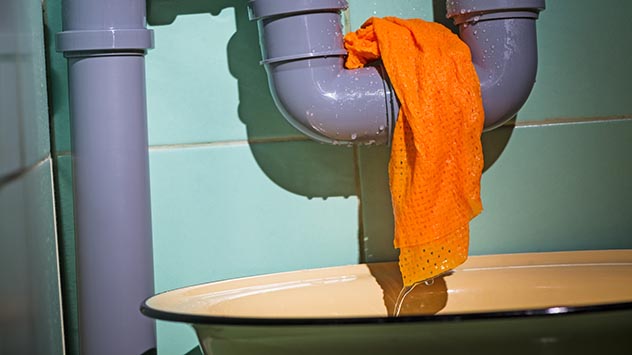If your plumbing system is leaking water, the first step in fixing it is to identify where it is leaking. It is best to call a plumber for this. They will be able to identify where the leak is coming from, fix it, and ensure that it didn’t damage anything else. In addition, they can also help prevent it from happening again.
Is Your Plumbing Leaking?
Plumbing leaks can do extensive damage to your home. Sometimes, these leaks are hidden behind a wall or under the floor and may not be noticeable. Therefore, you need to learn how to detect hidden plumbing leaks. Fortunately, there are some simple signs that you can look for.
The most common sign of a plumbing leak is a musty odor from the pipes. This can occur for various reasons, including a cracked or burst pipe. If this is the case, it’s time to call in a plumber.
Checking the water meter is another way to detect a leak. To do this, shut off the water in your home and check the meter for several hours. If the number on the meter has changed, there’s a leak somewhere. Also, check the shut-off valve in your main water supply pipe in the utility room or basement.
What Is The Sign Of A Leaking House Pipe?
A leaky house pipe can be a huge problem for a home. Water can damage structures if left unchecked. The problem can be difficult to detect at first, but a leak can be quickly detected with the right tools and techniques.
The first thing to do when you see water coming out of your pipes is to call a plumber. A plumber will be able to fix the problem quickly and will come out at your convenience. The best thing to do is to avoid letting water build up inside your house.
Another obvious sign of a leak is the smell of water. If the smell is unpleasant or musty, then you leak. A leaky pipe is likely causing the smell, so it is important to call a plumber. Avoid repairing a leak alone – attempting to fix the problem yourself may mask a larger issue.
What To Do If Plumbing Is Leaking?
Leaking pipes can be very dangerous, and you may need to contact a professional plumber immediately. They have the right tools to fix leaks efficiently, and they can also advise you on filing an insurance claim. If you are unsure how to fix a leak yourself, you can try turning off the water valve in your home, but this may only provide a temporary fix. Signs of a leaking pipe include water pooling on the floor, peeling wallpaper, and an unpleasant smell. Mold can also cause this.
The first thing to do is turn off the water supply at the main shut-off valve and turn on a nearby tap. This will cut off the flow of water and make the cleanup easier. After you’ve turned off the water, clean the floor of any standing water and ensure that the plumbing leak doesn’t spread to other home areas. You may also want to take pictures of the damage, which will be important for your homeowners’ insurance adjuster.
What Causes A Plumbing Leak?
Understanding what causes a plumbing leak is essential for keeping your home and family safe. Even small leaks can lead to huge damage, not to mention health risks. Luckily, most leaks are preventable if you catch them early. Learn the most common causes and how to fix them. Listed below are ten common causes of leaks.
Plumbing leaks have many causes, from poor water pressure to damaged pipe joints. You may not realize it, but water line leaks are more common than you might think. Water lines are often made from polybutylene, a pipe highly vulnerable to bursting. This is why inspecting your pipes as soon as you notice a leak is important. If you fail to do this, the problem will only worsen and require more costly repairs.
Another major cause is a clog in a pipe. Pipes can become clogged when they experience drastic temperature changes. Extreme cold or hot temperatures can weaken a pipe, causing it to crack or burst.
Where Do Most Home Water Leaks Occur?
Water leaks can cause extensive damage to a home. If left unchecked, they can cause wood to rot or drywall to grow mold. In addition, they can lead to high water bills. This is especially bad for those who are trying to save water. Therefore, it is vital to learn how to spot hidden leaks.
Several different sources can cause water leaks. One of the most common causes of leaks is the corrosion of pipes. Older pipes are especially vulnerable to rust and corrosion. Leaks can also happen at the joints of pipes. If the leak is hidden, the homeowner may never notice the leak.
The best way to detect plumbing leaks is to check your water meter. If it is running at an unusually high level, you should shut off the water in your home. You may be able to spot a slow leak by observing puddles on the ground.
Does Homeowners Insurance Cover a Water Leak?
If you notice a water leak in your home, you may wonder if your homeowner’s insurance covers it. In most cases, the answer is no, but some exceptions exist. A water leak that has not been there for a long time may not be covered under standard homeowners insurance. The reason is that it could be a result of a variety of different situations. Call your agent if you’re unsure whether your insurance policy covers the incident.
For instance, your policy may not cover a faulty washing machine, burst pipe, or plumbing. However, if the leak was caused by negligence or faulty maintenance, your homeowner’s insurance may cover it. You must ensure that you’re properly maintaining the pipes and appliances and that your insurance company won’t see that you’ve been neglecting them.
When you’ve discovered a water leak, call your insurance company as soon as possible to file a claim. A representative will look at the situation and estimate how much damage it’s caused. Some homeowners may need immediate repairs, so you should document the repairs in writing and keep all receipts handy.
What Is The Cost Of Fixing A Wall Leak?
The cost to repair a leak in the wall can range from $350 to more than $2,000, depending on the size and severity of the leak. In order to solve a problem, the first step is to identify it. Usually, this involves cutting into the wall to get at the leak. The cost of this step is the most expensive part of the repair. The next step is to replace the damaged pipes and patch the walls.
An infrared camera to detect hidden leaks is an effective way to find a leak. These cameras work by measuring the surface temperature and infrared energy. When the temperature falls below a certain threshold, the leak is located. You can rent or buy this equipment from a home improvement store. Professional restoration companies will use this equipment to find hidden leaks in walls. Learning how to fix a leak in the wall can save you time and money by reducing the likelihood of major water damage.
Once you know the source of the leak, you can choose the best solution for the problem. Water leaks usually originate from pinholes in the plumbing system or small failures in exterior materials. Once water gets into a home, it travels along the framing in the walls. You can use an infrared camera or moisture meter to locate a leak in the wall. If you find any signs of water damage, it’s important to contact your insurance company.
Does Insurance Cover Plumbing Issues?
If your house is old, the chances are that your pipes will need to be replaced sooner or later. If purchasing homeowners insurance, ensure you understand the coverage limits and deductibles. Homeowners’ insurance policies cover a range of damages, including personal assets and injuries on the property. In addition, liability limits determine the amount that insurers will pay for any repairs. However, your policy might not cover the repair if the problem is as simple as a slow leak.
Insurance might not cover some plumbing repairs, but you can avoid the issue by performing preventative maintenance. For example, you should check your hoses regularly for wear and tear. You should also clean and replace them, especially if damaged. You should also check water supply lines for damage, as a damaged water supply line can cause a backup. Additionally, it would be best to drain your water heater twice a year to prevent sediment buildup. Lastly, you should also ensure that your pipes are properly insulated to prevent freezing.
If you have homeowners insurance, it may cover plumbing issues. Most policies cover plumbing damage if it’s part of the dwelling portion of the policy. Broken pipes or leaks can cause significant damage to your home.
Conclusion
The corrosion of cast iron pipes occurs over time when they are exposed to water and oxygen. In older water heaters, corrosion can cause pinholes along their bottoms. During cold winters, exterior water faucet pipes can break because they freeze and expand. Keep an eye on that water bill month to month. An enormous water bill can result from a leak in your main water service. You could have a pipe leak if you see these outside the tub area.
Add a few drops of food coloring to your toilet tank to test for leaks, and wait 10 minutes. You may have a leak in your tank that allows water to flow from the tank to your drain without flushing it. All of the above are signs of a leak, but remember that not all water leaks are plumbing leaks. Internal pipes and detect hidden water leaks, technicians and plumbers traditionally used jackhammers to dig up floors and break through the drywall.



